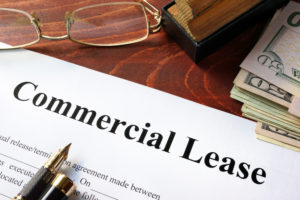 Commercial leases are lengthy, complicated documents and the sections about rent can be particularly confusing for a prospective tenant. To avoid unpleasant surprises and unexpected expenses during your lease term, you need an experienced real estate lawyer who fully understands these intricate contract provisions and knows how to negotiate them with landlords and management companies.
Commercial leases are lengthy, complicated documents and the sections about rent can be particularly confusing for a prospective tenant. To avoid unpleasant surprises and unexpected expenses during your lease term, you need an experienced real estate lawyer who fully understands these intricate contract provisions and knows how to negotiate them with landlords and management companies.
Typical Rent Terms
Some of the common rent structures are:
- Single net lease or net lease: In addition to “base rent” (typically a dollar amount per square foot of leased space) and utilities (if not included as part of base rent), the tenant pays a portion of the property taxes levied on the building calculated by the percentage of space leased in the building. The landlord continues to be responsible for all building maintenance, repairs and insurance (and the remaining balance of the taxes).
- Net-net, or double net lease: Tenant pays base rent and utilities and is responsible for its portion of the building’s property taxes and insurance premiums based on the percentage of space leased in the building. Landlord pays for all building maintenance and repairs (plus the remaining balance of taxes and insurance).
- Triple net lease: Tenant pays its portion of all costs of the building (property taxes, insurance, repairs and maintenance) based on its percentage of the space, except that the landlord typically remains responsible for structural and otherwise major repairs to the building (plus the remaining portion of building’s taxes, insurance and maintenance).
- Gross lease: Tenant pays only base rent (sometimes plus utilities) with landlord remaining responsible for all of the building’s taxes, insurance, repairs and maintenance.
- Modified gross lease: The lease functions as a gross lease for some initial period (i.e. tenant pays only base rent) but at some point during the term the tenant agrees to pay a portion of the building’s operating expenses (taxes, insurance and maintenance).
- Percentage lease: Used almost exclusively for leases of retail space, this type of lease means some portion of the rent is calculated as a percentage of the sales the tenant generates from customers at the property.
Other Important Rent Issues
As a prospective commercial tenant you also need complete clarity on how and when the rent can be increased — both on an annual basis and cumulatively over the entire lease term.
Also keep in mind that lawyers can slice and dice rent provisions a million different ways. Exactly what constitutes “leased space” for purposes of calculating base rent is typically negotiated along with precisely which building expenses qualify as “utilities,” “insurance” or “maintenance.”
The experienced St. Augustine real estate lawyers at Ansbacher Law can provide the representation you need for your commercial lease. Call us at 904-429-4833 for an initial consultation today.

